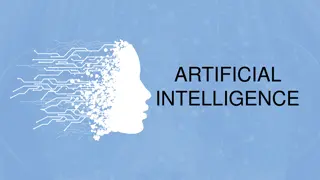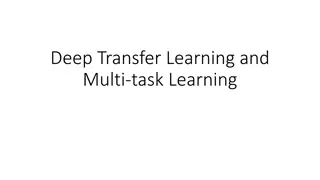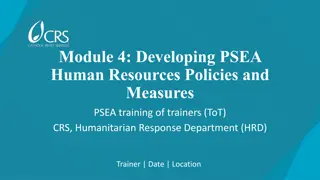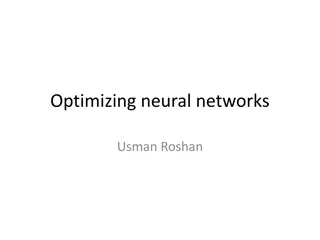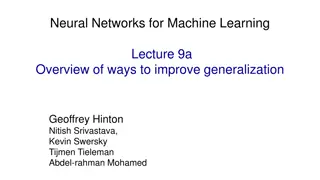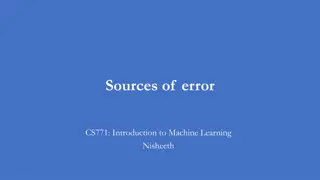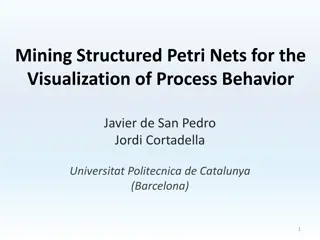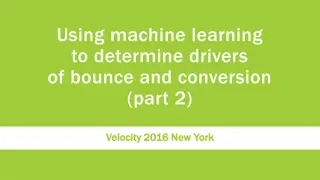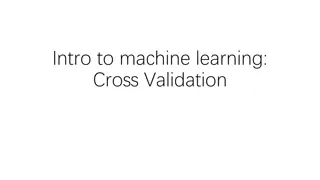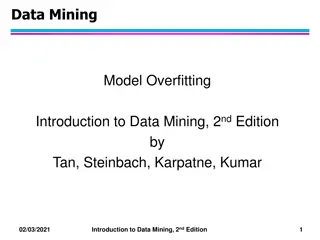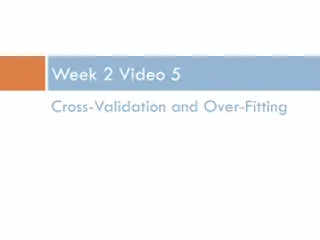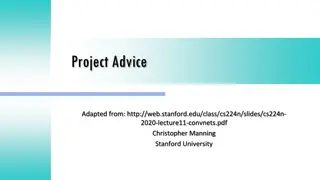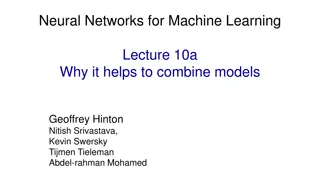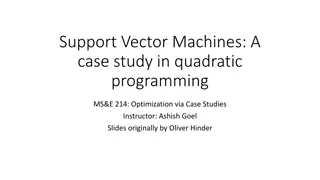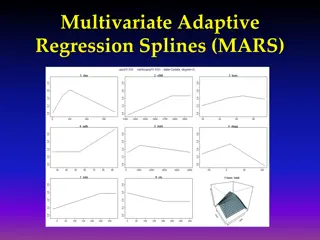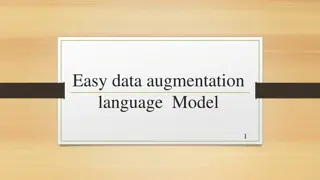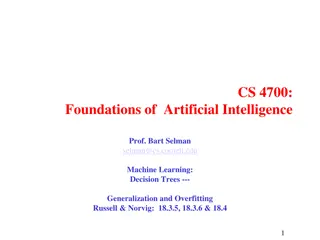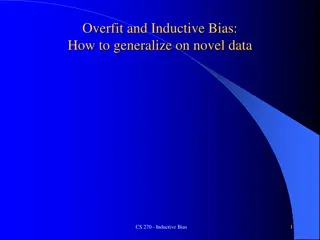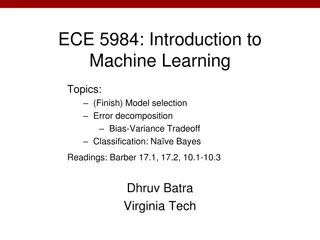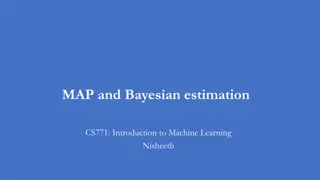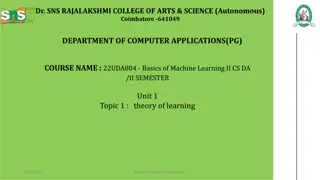Data Augmentation Techniques for Deep Learning-Based Medical Image Analyses
Various data augmentation techniques for improving deep learning-based medical image analyses. It covers topics such as overfitting, data labeling, and the use of generative adversarial networks (GANs).
6 views • 14 slides
Recognizing and Preventing Sexual Harassment: Supervisor Training Program
This sexual harassment prevention training for supervisors covers the importance of recognizing, responding to, and preventing sexual harassment in the workplace. It outlines what constitutes sexual harassment, the two forms of harassment (quid pro quo and hostile work environment), and the legal ob
6 views • 36 slides
Model Evaluation in Artificial Intelligence
Exploring the evaluation stage in AI model development, how to assess model reliability, avoid overfitting and underfitting, and understand key terminologies like True Positive, True Negative, and False Positive in a forest fire prediction scenario.
7 views • 26 slides
Deep Transfer Learning and Multi-task Learning
Deep Transfer Learning and Multi-task Learning involve transferring knowledge from a source domain to a target domain, benefiting tasks such as image classification, sentiment analysis, and time series prediction. Taxonomies of Transfer Learning categorize approaches like model fine-tuning, multi-ta
5 views • 26 slides
Enhancing Human Resources for Preventing Sexual Exploitation and Abuse in Humanitarian Responses
This training module focuses on developing policies and measures to promote staff awareness and accountability in preventing sexual exploitation and abuse (PSEA) within humanitarian organizations. The sessions cover strategies for raising staff awareness, integrating PSEA responsibilities into job d
1 views • 22 slides
Bias and Variance in Machine Learning Models
Explore the concepts of overfitting, underfitting, bias, and variance in machine learning through visualizations and explanations by Geoff Hulten. Learn how bias error and variance error impact model performance, with tips on finding the right balance for optimal results.
2 views • 22 slides
Optimization Techniques in Neural Networks
Optimization is essential in neural networks to find the minimum value of a function. Techniques like local search, gradient descent, and stochastic gradient descent are used to minimize non-linear objectives with multiple local minima. Challenges such as overfitting and getting stuck in local minim
5 views • 9 slides
Strategies for Improving Generalization in Neural Networks
Overfitting in neural networks occurs due to the model fitting both real patterns and sampling errors in the training data. The article discusses ways to prevent overfitting, such as using different models, adjusting model capacity, and controlling neural network capacity through various methods lik
1 views • 39 slides
Sources of Error in Machine Learning
This comprehensive overview covers key concepts in machine learning, such as sources of error, cross-validation, hyperparameter selection, generalization, bias-variance trade-off, and error components. By delving into the intricacies of bias, variance, underfitting, and overfitting, the material hel
3 views • 13 slides
Visualization of Process Behavior Using Structured Petri Nets
Explore the concept of mining structured Petri nets for visualizing process behavior, distinguishing between overfitting and underfitting models, and proposing a method to extract structured slices from event logs. The approach involves constructing LTS from logs, synthesizing Petri nets, and presen
1 views • 26 slides
Utilizing Machine Learning for Conversion and Bounce Analysis
Machine learning techniques such as deep learning and random forest are employed to analyze drivers of bounce and conversion rates in a Velocity 2016 New York event. The process involves vectorizing and balancing the data, smoothing it for optimal performance, and validating on separate datasets to
2 views • 41 slides
Cross-Validation in Machine Learning
Cross-validation is a crucial technique in machine learning used to evaluate model performance. It involves dividing data into training and validation sets to prevent overfitting and assess predictive accuracy. Mean Squared Error (MSE) and Root Mean Squared Error (RMSE) quantify prediction accuracy,
7 views • 19 slides
Kitchen Safety and Sanitation: A Guide to Preventing Accidents
Enhance your kitchen safety and sanitation practices by identifying unsafe aspects in the kitchen, preventing accidents like spills, cuts, and burns, and implementing general safety measures. Learn the importance of immediate clean-up, prior knowledge of equipment, and careful planning to maintain a
23 views • 21 slides
Optimizing SG Filter Parameters for Power Calibration in Experimental Setup
In this investigation, the aim is to find the optimal SG filter parameters to minimize uncertainty in power calibration while avoiding overfitting. Analyzing power calibration measurements and applying SG filter techniques, the process involves comparing different parameters to enhance filter perfor
4 views • 21 slides
Overfitting in Data Mining Models
Overfitting is a common issue in data mining models where the model performs exceptionally well on the training data but fails to generalize to new data. This content discusses how overfitting can occur, its impact on model performance, and strategies to mitigate it. Through examples and visualizati
1 views • 30 slides
Cross-Validation and Overfitting in Machine Learning
Overfitting is a common issue in machine learning where a model fits too closely to the training data, capturing noise instead of the underlying pattern. Cross-validation is a technique used to assess a model's generalizability by splitting data into subsets for training and testing. Strategies to r
21 views • 24 slides
Methods for Handling Collinearity in Linear Regression
Linear regression can face issues such as overfitting, poor generalizability, and collinearity when dealing with multiple predictors. Collinearity, where predictors are linearly related, can lead to unstable model estimates. To address this, penalized regression methods like Ridge and Elastic Net ca
4 views • 70 slides
Best Practices for Dataset Handling in Machine Learning Projects
Proper dataset handling is crucial in machine learning projects. Use publicly available datasets with train/dev/test splits or create your own. Be cautious of overfitting by utilizing independent validation and test sets. Avoid touching the test set until final evaluation to prevent overfitting. Mai
7 views • 13 slides
Combining Neural Networks for Reduced Overfitting
Combining multiple models in neural networks helps reduce overfitting by balancing the bias-variance trade-off. Averaging predictions from diverse models can improve overall performance, especially when individual models make different predictions. By combining models with varying capacities, we can
2 views • 41 slides
Support Vector Machines in Quadratic Programming for Heart Disease Prediction
This case study explores the application of support vector machines in quadratic programming for predicting heart disease in patients. The process involves fitting a linear classification model to real patient data, splitting the dataset into training and test sets, optimizing model parameters, and
3 views • 19 slides
Multivariate Adaptive Regression Splines (MARS)
Multivariate Adaptive Regression Splines (MARS) is a flexible modeling technique that constructs complex relationships using a set of basis functions chosen from a library. The basis functions are selected through a combination of forward selection and backward elimination processes to build a smoot
3 views • 13 slides
Easy Data Augmentation for Language Models
Data augmentation plays a crucial role in enhancing model performance, especially for tasks like sentiment analysis, topic labeling, and language detection. By generating more training data and reducing overfitting, techniques like Synonym Replacement, Random Insertion, Random Swap, and Random Delet
2 views • 12 slides
Machine Learning: Decision Trees and Overfitting
Foundations of Artificial Intelligence delve into the intricacies of Machine Learning, focusing on Decision Trees, generalization, overfitting, and model selection. The extensions of the Decision Tree Learning Algorithm address challenges such as noisy data, model overfitting, and methods like cross
0 views • 13 slides
Overfitting and Inductive Bias in Machine Learning
Overfitting can hinder generalization on novel data, necessitating the consideration of inductive bias. Linear regression struggles with non-linear tasks, highlighting the need for non-linear surfaces or feature pre-processing. Techniques like regularization in linear regression help maintain model
6 views • 37 slides
Model Bias and Optimization in Machine Learning
Learn about the concepts of model bias, loss on training data, and optimization issues in the context of machine learning. Discover strategies to address model bias, deal with large or small losses, and optimize models effectively to improve performance and accuracy. Gain insights into splitting tra
1 views • 29 slides
Introduction to Advanced Topics in Data Analysis and Machine Learning
Explore advanced topics in data analysis by Shai Carmi, covering machine learning basics, regression, overfitting, bias-variance tradeoff, classifiers, cross-validation, with additional readings in statistical learning and pattern recognition. Discover the motivation behind using data for medical di
0 views • 75 slides
Introduction to Machine Learning: Model Selection and Error Decomposition
This course covers topics such as model selection, error decomposition, bias-variance tradeoff, and classification using Naive Bayes. Students are required to implement linear regression, Naive Bayes, and logistic regression for homework. Important administrative information about deadlines, mid-ter
6 views • 42 slides
Maximum Likelihood Estimation in Machine Learning
In the realm of machine learning, Maximum Likelihood Estimation (MLE) plays a crucial role in estimating parameters by maximizing the likelihood of observed data. This process involves optimizing log-likelihood functions for better numerical stability and efficiency. MLE aims to find parameters that
6 views • 18 slides
Concept Development and Implementation of Ridge Regression in Genomic Selection
This presentation delves into the concept development and implementation of ridge regression in genomic selection, emphasizing the importance of avoiding overfitting by regulating parameters and distinguishing between fixed and random effects. The pioneers of ridge regression and Bayesian methods ar
1 views • 26 slides
Neural Network Optimization and Loss Functions
Explore the concepts of neural network optimization, forward and back propagation, loss functions, overfitting, and solutions to parameter overfitting. Understand the importance of model order, training data, and testing loss for accurate machine learning system performance.
2 views • 10 slides
Tuning ANNs for Improved Performance
ANNs face challenges like over-parameterization and non-convex optimization. Learn how to optimize ANN models with considerations in starting values, avoiding overfitting, and selecting hidden units. Discover the impact of starting values, likelihood of overfitting, weight decay, and scaling inputs
2 views • 43 slides
Exploring Theory of Learning in Machine Learning and AI
Understanding the theory of learning in machine learning and artificial intelligence involves formal frameworks and mathematical principles that explain how learning systems improve based on data, experience, or feedback. It encompasses components like tasks, environments, hypothesis spaces, data, a
5 views • 11 slides
Overfitting and Decision Trees in Data Mining
Explore the concepts of overfitting, classification errors, and decision trees in data mining through practical examples and visualizations. Learn about the impact of increasing the number of nodes in decision trees and how it affects model performance. Stay updated on the latest news related to dat
0 views • 19 slides
Preventing Fraud in Aeries: Understanding, Detecting, and Preventing Fraud
Learn about the culture of trust within Aeries and the importance of preventing fraud. Discover the types of fraud, ways to detect them, and helpful strategies to safeguard against fraud within organizations like Aeries.
3 views • 13 slides
DisturbLabel Algorithm for CNN Regularization
Learn about the innovative DisturbLabel algorithm that focuses on regularizing CNN models on the loss layer. Explore how CNN regularization techniques like weight decay, data augmentation, and dropout play a crucial role in preventing overfitting and enhancing model performance in large-scale visual
1 views • 35 slides
Avoiding Overfitting in Business Intelligence and Analytics
In the realm of Business Intelligence and Analytics, it is crucial to navigate the fine line between overfitting and generalization. Overfitting occurs when models capture noise in training data rather than underlying patterns. This session delves into concepts of generalization, overfitting, and st
1 views • 41 slides
Model Overfitting in Data Mining
Explore the concept of model overfitting in data mining, including classification errors, generalization errors, decision trees, and the impact of model complexity on training and test errors. Learn how to identify and address overfitting and underfitting issues for better model performance.
3 views • 17 slides
Preventing Overfitting in Neural Networks with Dropout Technique
Learn about the Dropout technique proposed by Srivastava et al. to prevent overfitting in neural networks. The technique involves randomly dropping units during training to prevent co-adaptation, leading to improved performance on various supervised learning tasks in vision, speech recognition, and
0 views • 21 slides
Economic Valuation of Preventing Non-Fatal Road Injuries: Literature Review
Explore the economic valuation of preventing non-fatal road injuries through a comprehensive literature review, focusing on the monetary aspects and methods used for valuation in transportation projects. Key topics include costs per injury severity, valuation methods, and the aim to identify the mos
5 views • 16 slides
Understanding Overfitting in Machine Learning
Learn about overfitting in machine learning, how to detect it, prevent it, and the role of regularization in reducing generalization error. Explore techniques to avoid overfitting and improve model performance through proper training and testing sets.
0 views • 10 slides


